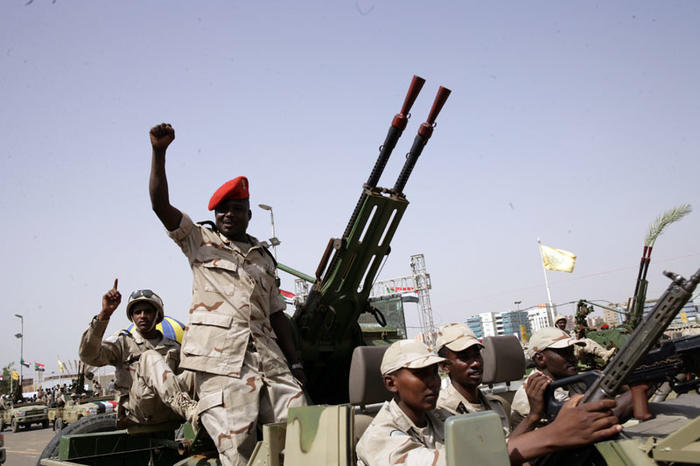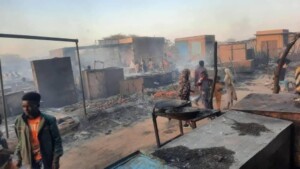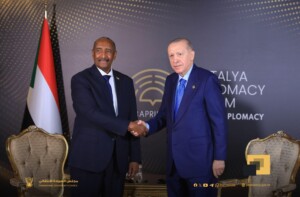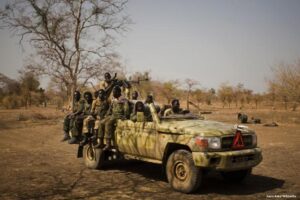Sudan RSF ‘in full control’ of El Gezira, appoints former army officer as commander

RSF paramilitaries (File photo: SUNA)
The Rapid Support Forces (RSF) announced their full control of El Gezira yesterday. The day before, the Sudan Armed Forces (SAF) reported the withdrawal of the 1st Infantry Division from the capital Wad Madani and investigations into the reasons of the defeat. Numerous posts by Sudanese on social media strongly criticise the army. Some demand the SAF command to be replaced.
On Monday morning, the RSF crossed the Hantoub Bridge, entered Wad Madani, capital of El Gezira, and took control of the 1st Infantry Division’s garrison.
RSF Commander-in-Chief Mohamed ‘Hemedti’ Dagalo yesterday assigned former army officer Abu Agla Keikel* as commander of the 1st Infantry Division in Wad Madani, which de facto means the rulership of El Gezira.
In a statement yesterday, Hemedti said that the residents of El Gezira “will remain safe, sound, and secure, as the RSF provides protection for all citizens, their money, and their honour”. He requested the tens of thousands of people who fled Wad Madani for fear of confrontations, to return safely to their homes.
Yet, the reputation of the RSF paramilitaries as dangerous and unruly groups of armed bandits causes the people in the state fear for the worst. Om Monday, @Kandakat_alhaqq said on their account on X: “I’m going to be extremely raw right now: women in Madani are preparing to get raped. Let that sink in.”
SAF statement
Brig Nabil Abdallah, spokesperson for the SAF announced the withdrawal of the 1st Infantry Division from the capital Wad Madani in a statement on Monday, more than 24 hours after RSF paramilitaries entered Wad Madani, after four days of army resistance, mostly by airstrikes.
The spokesperson said that investigations were being conducted into the circumstances that led to the withdrawal of army forces from their positions in El Gezira following attacks by the RSF. “The results of the investigation will be submitted to the competent authorities upon completion, after which the facts will be made available to the public.”
This is the first time the SAF announces investigations into a defeat. After the RSF took control of four capital cities in Darfur, the army kept quiet.
Reactions to the RSF’s swift move toward Wad Madani and control of El Gezira all point fingers to the weak position of the army, which was regularly purged by Al Bashir fearing counter-coups against him. Numerous social media posts by Sudanese strongly criticise the SAF. Some demand the army command to be replaced.
Yet, also Islamists, influential in army circles, denounced the SAF defeat in El Gezira.
Sudan War Monitor (SWM) today mentioned Ali Karti**, leader of the Islamic Movement, “who issued an audio recording yesterday that included a veiled warning to the military leadership: “Opportunities do not come again, and the people’s support for you depends on you standing with them in moments of adversity and affliction.”
Karti, Minister of Foreign Affairs in the government of Omar Al Bashir, “also implicitly criticized the military for misleading the public about the war: “Address the people with the facts, do not leave them preyed on by rumours and the machinations of the rebels who aim to weaken the people’s confidence in you,” SWM reported.
The RSF are now in control of most of Darfur, several areas in Kordofan, a large part of Khartoum state, and El Gezira, while the eastern and northern parts of the country remain in control of the SAF.
‘Perspective’
In his statement yesterday, Hemedti also repeated that that his militia does not intend to be an alternative to the SAF – “which was destroyed by the remnants [Islamist affiliates of the Al Bashir regime] by corruption, neglect, favouritism, and politicisation”.
The militia leader called on the international community, especially Sudan’s neighbouring countries, “to positively deal with the major transformations taking place in Sudan today, as they are an opportunity to change Sudan … and build a new political system that represents all Sudanese and reflects their legitimate ambitions and aspirations for a better life”.
Jaafar Hasan, spokesperson for the Forces for Freedom and Change-Central Council (FFC-CC), told Radio Dabanga yesterday that the war “could have stopped on its first day or would not have started at all, if the Framework Agreement, which went a long way in security and military reform, had been signed by both SAF and RSF”.
He accused Islamist affiliates of the Al Bashir regime of “blocking the way to the signing of the agreement and ignited this damned war”.
Regarding the future of the current situation, the FFC-CC sees four scenarios: “The army wins, the RSF wins, the two sides will reach a settlement, or an international force will intervene and subjugate them with force to end the war”.
Hasan warned that “each of these scenarios poses its particular problems” and called on “the Sudanese political forces to deal with the war from a broader and more comprehensive perspective”.
* Earlier this month, Abu Agla Keikel, was seen heading a small RSF convoy in the Butana plains in El Gedaref, east of El Gezira. Keikel, a former army officer from eastern Sudan, set up the Sudan Shield Forces (SSF) in El Butana in El Gedaref in the end of 2022. A military expert accused supporters of the defunct Al Bashir regime responsible for the formation of the SSF and other new militias supporting the army. The SSF was allowed by the authorities to hold rallies in eastern and central Sudan, including Khartoum. In August however, Keikel changed sides and joined the [better paying] RSF.
** In late September, the USA imposed sanctions on Ali Karti, head of the Islamic Movement in Sudan, and two companies affiliated with the RSF. The US State Department also imposed visa restrictions on other Islamists and former regime officials, because they ‘undermined the transition to democracy in Sudan’.











 and then
and then